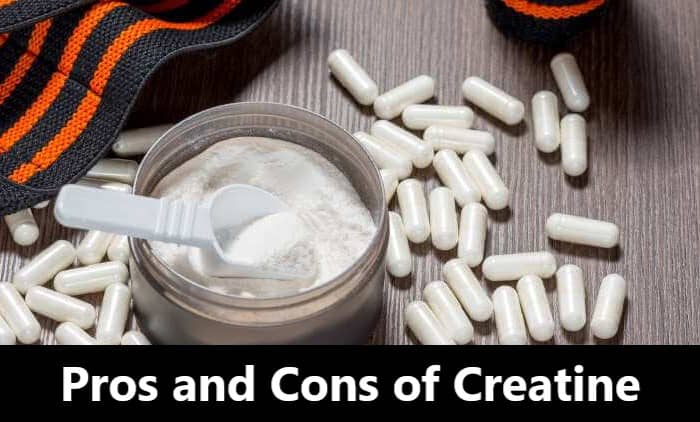Should You Take Creatine? Weighing The Pros And Cons

Table of Contents
The Benefits of Creatine Supplementation
Creatine monohydrate, the most researched and commonly used form, offers several compelling advantages for individuals focused on improving their physical performance and body composition.
Increased Muscle Strength and Power
Creatine plays a crucial role in ATP (adenosine triphosphate) production, the primary energy source for high-intensity exercise. By increasing ATP availability, creatine enables muscles to perform more repetitions and generate greater force. Numerous studies have demonstrated significant improvements in:
- Increased 1RM (one-repetition maximum) in bench press, squat, and deadlift: Studies consistently show that creatine supplementation leads to noticeable increases in strength, allowing individuals to lift heavier weights.
- Improved sprint times: Creatine's impact on ATP replenishment translates to faster sprinting speeds and improved performance in other anaerobic activities.
- Enhanced power output during plyometrics: Activities like box jumps and depth jumps benefit significantly from creatine's ability to boost explosive power.
Enhanced Muscle Growth and Hypertrophy
Beyond strength gains, creatine contributes significantly to muscle growth (hypertrophy). It does this by:
- Promoting muscle protein synthesis: Creatine helps stimulate the processes that build and repair muscle tissue, leading to increased muscle mass over time.
- Increasing cell hydration: Creatine attracts water into muscle cells, creating a more anabolic environment conducive to muscle growth.
- Improved muscle mass gain: Numerous studies confirm that creatine supplementation, combined with resistance training, leads to greater gains in lean muscle mass compared to resistance training alone.
- Faster recovery times: Creatine can aid in reducing muscle damage and promoting faster recovery between workouts, allowing for more frequent and intense training.
Improved Cognitive Function (in some studies)
While primarily known for its physical benefits, some research suggests that creatine may offer cognitive advantages. Studies have shown potential improvements in:
- Memory: Creatine may enhance short-term and working memory, particularly in individuals with cognitive impairments.
- Reasoning: Some studies have observed improvements in cognitive function and reasoning abilities.
It's crucial to note that the cognitive benefits of creatine are not consistently observed across all studies and more research is needed to confirm these effects definitively.
Potential Side Effects and Risks of Creatine
While generally safe for healthy individuals, creatine supplementation can cause some side effects, most of which are mild and temporary.
Water Retention and Weight Gain
Creatine's mechanism of action involves drawing water into muscle cells, which can lead to temporary weight gain and bloating. This is usually not cause for concern, and the weight gain is primarily due to water retention, not fat accumulation. Adequate hydration helps manage this effect.
Gastrointestinal Issues
Some individuals experience mild gastrointestinal discomfort, such as:
- Nausea
- Diarrhea
- Stomach cramps
These side effects are usually dose-dependent and can often be mitigated by starting with a lower dosage and gradually increasing it, or by taking creatine with food.
Kidney Function Concerns (Debunking Myths)
Contrary to popular misconceptions, creatine supplementation does not cause kidney damage in healthy individuals when used responsibly and with adequate hydration. Extensive research has consistently refuted this claim. However, individuals with pre-existing kidney conditions should consult their doctor before using creatine.
Who Should (and Shouldn't) Take Creatine?
Creatine supplementation can be beneficial for a wide range of individuals, but it's not suitable for everyone.
Ideal candidates:
- Athletes (especially those involved in high-intensity activities)
- Weightlifters and bodybuilders
- Individuals aiming to increase muscle mass and strength
Individuals who should avoid creatine:
- People with kidney disease
- Pregnant or breastfeeding women
- Individuals with certain medical conditions (consult a doctor)
Important Considerations: Age, training experience, individual health conditions and goals should all be considered before starting creatine supplementation.
Conclusion
Creatine supplementation can offer significant benefits for muscle growth, strength, and power, but it's crucial to weigh these advantages against potential side effects. Understanding the risks and rewards, as outlined above, allows you to make an informed decision about whether or not creatine is right for your individual needs. Before starting any supplement regimen, including creatine, consult with your physician or a registered dietitian. Remember, responsible use and awareness of potential side effects are key to maximizing the benefits of creatine supplementation. Make an informed choice – should you take creatine? The answer depends on your personal circumstances and goals.

Featured Posts
-
 Fbi Investigation Massive Office365 Executive Account Data Breach
May 15, 2025
Fbi Investigation Massive Office365 Executive Account Data Breach
May 15, 2025 -
 Is Steams New Free Game Any Good A Critical Analysis
May 15, 2025
Is Steams New Free Game Any Good A Critical Analysis
May 15, 2025 -
 Jake Peavy Returns To Padres As Special Assistant To Ceo
May 15, 2025
Jake Peavy Returns To Padres As Special Assistant To Ceo
May 15, 2025 -
 2026 Bmw I X A Best Case Scenario Electric Vehicle
May 15, 2025
2026 Bmw I X A Best Case Scenario Electric Vehicle
May 15, 2025 -
 Dodgers Minor League Standouts Kim Hope Phillips And Miller
May 15, 2025
Dodgers Minor League Standouts Kim Hope Phillips And Miller
May 15, 2025
